Human Flower Project
This Blessed Plot
What happened to the front garden? The original home theater and neighborhood forum, a gift that’s been retracted. (Thank you, John.)
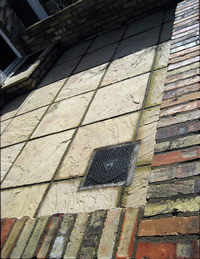 Essay and photos by John Levett
Essay and photos by John Levett
There’s a saying: ‘Don’t change yer clout ‘til may is out.’ Discussion used to always arise about whether changing clout (clothing) should take place after the may (hawthorn) came out or May came in. Whatever. The may is out and in these parts it feels as if the season is on the turn. The weather has been kind this year. It’s just turned March and I’m in credit with the energy company. We had a cold spell at the opening of February but you get the feeling that that’s that.
March is busy: finish pruning anything left before nesting time, clear the space of rubbish, repair paths, wash out the shed & re-prime, buy in the mulch, first feed, tie in stray shoots, secure ramblers—get to the point where you feel you can start sitting in the garden. It’s a long month to come before I’m in that state but it’s started.
It’s a time when the planning trope creeps back in. What’s the new grand design? What’s not there that should be? What have I always planned to raise? Everything’s possible at this time. Nothing that’s not worth a shot. Gardening in heroic mode. (Note to self: “Yes it’s failure, but how good a failure?” – Cornell West.)
 I was walking out yesterday morning in full sun and crisp and up the hill to Newmarket Road and for no reason at all started remarking the front gardens of the terraces I was passing. At that point I walked back down the hill and started snapping them.
I was walking out yesterday morning in full sun and crisp and up the hill to Newmarket Road and for no reason at all started remarking the front gardens of the terraces I was passing. At that point I walked back down the hill and started snapping them.
There’s a problem with the small plots that pass for (or are sold as) gardens. These plots were never originally sold as anything other than the space where the track ended and the front door began. Such, however, is the place of the front garden in English gardening status that multiple solutions are applied to turn it into something worth looking at or even worth stopping for. I think the high tide of The-English-Front-Garden-As-Class-Signifier was probably in the 1950s, a time when you could still expect a decent wedge of space between you and passing trade; the front bordered-lawn was the accepted mode of making a public statement regarding one’s horticultural provenance.
I can recall the labour that went into that lawn: mowing, trimming, scarifying, sharp-sanding, re-seeding, weeding, feeding, watering. I can’t recall any other plant that had the same catalogue of maintenance. Along with the lawn came the bedding plants, in that decade most probably raised in the greenhouse round back.
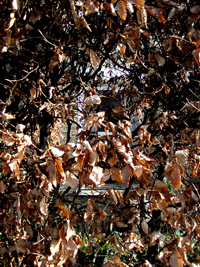 Remembering my Uncle Jack in Beckenham, gardening was the equivalent of running a second job & moonlighting on another. He won prizes both for the garden and for the crops. I don’t know if it’s still the practice but large firms of his day (he worked for a company of printers) were never without a gardening club and the trade in plants and seeds was empire-size. Alongside that were the plant nurseries, not only those of the general kind but the specialists too. I can recall in the ‘70s driving down to Bolton’s in Essex every September to pick up packets of fresh sweet pea seeds. Essex two decades earlier was host to a multitude of seed merchants particularly around the Cheshunt area.
Remembering my Uncle Jack in Beckenham, gardening was the equivalent of running a second job & moonlighting on another. He won prizes both for the garden and for the crops. I don’t know if it’s still the practice but large firms of his day (he worked for a company of printers) were never without a gardening club and the trade in plants and seeds was empire-size. Alongside that were the plant nurseries, not only those of the general kind but the specialists too. I can recall in the ‘70s driving down to Bolton’s in Essex every September to pick up packets of fresh sweet pea seeds. Essex two decades earlier was host to a multitude of seed merchants particularly around the Cheshunt area.
One of the encouragements to targeted cultivation of the front plot was often its size. The post-war suburban house and garden was most often the 1920s or 1930s house and garden. It wasn’t until close to the mid-‘50s that the housing boom became nationwide and post-war Britain began to take on a new shape. Uncle Jack and Auntie Beattie had moved into their home in the early 1930s; in fact, they moved into the discounted show house on their estate. The garden space that they had to (Had to!) cultivate was enormous: space for greenhouse, potting shed-cum-garage, lawns front and back, orchard and so it went and nothing was left alone to flounder or deteriorate and the old ways were always the best and horticulture still existed in a pre-(Great) war mode, because that’s how his parents were brought up in Suffolk into which metropolitan ways had yet to march.
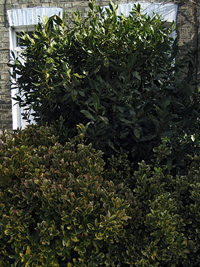 An aside: last year I was cycling out north of Ashwell close by the Hertfordshire-Cambridgeshire border and I stopped to ask a gentleman in his front garden which fork of two roads ahead I needed to take to arrive a particular village. “I’ve no idea, young sir. I’ve never been that way myself.” This said in what, as I talked with him, I could only take as a native Herts or Cambridge dialect by one who had not travelled outside his own village.
An aside: last year I was cycling out north of Ashwell close by the Hertfordshire-Cambridgeshire border and I stopped to ask a gentleman in his front garden which fork of two roads ahead I needed to take to arrive a particular village. “I’ve no idea, young sir. I’ve never been that way myself.” This said in what, as I talked with him, I could only take as a native Herts or Cambridge dialect by one who had not travelled outside his own village.
Time and tradition aren’t the same, but the aspiration lingers on. It’s too easy to acknowledge the role of the garden centre, the time-poor after-work moments, the distraction of instant alternatives to the contemplative and ruminative, but I wonder if there aren’t other influences at hand to take one away from the ‘doing’ of gardening.
I use the word ‘doing’ deliberately. I have been reading two of the works of John Holloway recently—‘How to Change the World Without Taking Power’ and ‘Crack Capitalism’—and I’m taken with the emphasis he places on the ‘doing’ and the retention of the ‘done’ i.e. the non-abstracted labour of ‘doing’ being retained by the ‘doer’ of the created ‘done,’ to be disposed of as he or she would choose—sell, trade, gift. Along with a colleague I am exploring more about ‘gift economy’ (see Lewis Hyde). Both us have recently made work and gifted it to each other and we are currently putting together a publication for gift or exchange outside the structure of capitalist monetary relations.
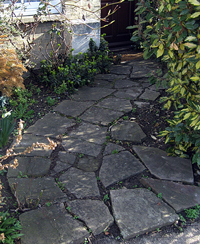 The prompt for this arose last year when my colleague expressed a wish to buy one of my pieces of work I told him that I wasn’t prepared to sell it to him but I’d exchange it for a hand-written copy of one of his poems. To this he said that he’d exchange the book. To which I said that the exchange wouldn’t be equal as he had already sold his labour to the publisher whereas I was gifting mine to him. I should point out here that this discussion was conducted in the best possible terms and resulted in a mutual exchange of hand-made objects, from found materials, in the spirit of gifting, i.e. both of us would have gifted our pieces even if the other had defaulted.
The prompt for this arose last year when my colleague expressed a wish to buy one of my pieces of work I told him that I wasn’t prepared to sell it to him but I’d exchange it for a hand-written copy of one of his poems. To this he said that he’d exchange the book. To which I said that the exchange wouldn’t be equal as he had already sold his labour to the publisher whereas I was gifting mine to him. I should point out here that this discussion was conducted in the best possible terms and resulted in a mutual exchange of hand-made objects, from found materials, in the spirit of gifting, i.e. both of us would have gifted our pieces even if the other had defaulted.
The discussion broadened out considerably into a general critique of cultural exchange. What emerged from this was that the exchange and the process of ‘doing’ that it contained was as much, if not more, important to us both than either of our finished objects; that what we had undertaken was a process both of making and engaging in the enhancement of a personal relationship. That relationship, which previously had been a mutually-respected but academic one, has now become a supportive and trusting friendship.
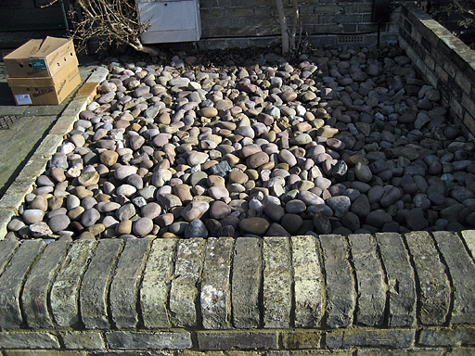
We know that the tendency of capitalist social relations is to translate human relations into exchange relations and to define exchange relations as monetary relations. Once that monetary relation is established and becomes hegemonic, then not only does the ‘done’ become objectified but so too does the ‘doer.’ In the meantime, and here’s the crucial question: “What becomes of the front garden?”
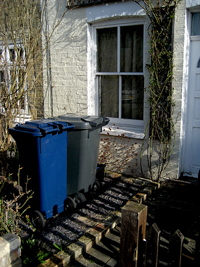 In days of ‘yore’ the front garden was fetishised but it was also a source of retained and exchanged ‘doing’—the subject of conversation, the exchange of expertise, the sharing of product, the creation of design, the site of leisure, the forum for debate, the theatre of family. All of these speak of communality and shared experience. In the grand days of the front garden it was in fact more than in speculation that neighbours would have shared many of their experiences—of schooling, of work, of war, of marriage and family; many of their ‘sharings’ would have been done in the same neighbourhood and between the same people—much like the good old fellow I met near Ashwell, whose universe was the church one way, the brook another, the post office a third and the railway bridge its boundary.
In days of ‘yore’ the front garden was fetishised but it was also a source of retained and exchanged ‘doing’—the subject of conversation, the exchange of expertise, the sharing of product, the creation of design, the site of leisure, the forum for debate, the theatre of family. All of these speak of communality and shared experience. In the grand days of the front garden it was in fact more than in speculation that neighbours would have shared many of their experiences—of schooling, of work, of war, of marriage and family; many of their ‘sharings’ would have been done in the same neighbourhood and between the same people—much like the good old fellow I met near Ashwell, whose universe was the church one way, the brook another, the post office a third and the railway bridge its boundary.
Our social relations are more fragmented and more time-bound, our paths to the same place variegated, our current lives multi-faceted and our histories less shared. Our foci reflect our global reach and our aspirations seek to match them. It is a commonplace now to spend periods of our lives working supportively, engagingly, energetically, successfully and upliftingly with people whom, after say twelve months, we will never see again. The common ground we tread is no longer most certain to be the path to a shared and mutual future.
Equally, the roots we put down can be as likely to finish as a sapling as a bower. The front garden gets the attention that our picture of our future projects. Time these days seem shorter that last year’s.

